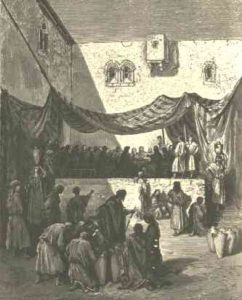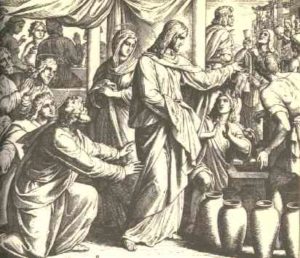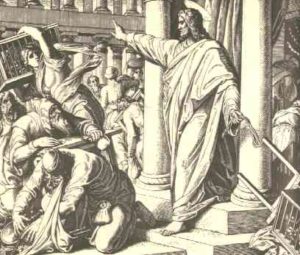Outline
The miracle at Cana. (Verse 1-11.)
Christ casts the buyers and sellers out of the temple. (Verse 12-22.)
Many believe in Christ. (Verse 23-25.)
1 And the third day there was a marriage in Cana of Galilee; and the mother of Jesus was there:
Mary is called the “mother of Jesus” – nowhere in the Bible is she ever called the “mother of God.” Mary gave birth to the human body of Jesus but was not the mother of his divine (ie. God) nature. Therefore it is incorrect to call her the mother of God.
In Israel the days are numbered so they don’t have names that represent pagan traditions like the word “sun” day named after the sun god, they are simply day one, day two, and day three etc.
So this marriage would have taken place on a Tuesday. Jewish people that are superstitious like to have their weddings on Tuesdays because it is the only day that God said that what he had created on that day was good twice. (Genesis 1:10 & 12)
They thing they have a double blessing on their marriage if they get married on that day.
It could not have been the next day after John’s baptism of Jesus because it was a good three days journey from where Jesus was baptized besides there was the temptation in the wilderness that had to occur in between which is left out of John’s gospel.
2 And both Jesus was called, and his disciples, to the marriage.
3 And when they wanted wine, the mother of Jesus saith unto him, They have no wine.
So much is made of Mary speaking four words to her son. I guess you have to because you can’t build a doctrine on these four small words, but the largest church in the world has.
Notice Jesus’ response, “Woman, what have I to do with thee?” First of all, to call her Woman, was a way of Jesus putting his mother in her place, spiritually speaking.
She wants Jesus to do a miracle, but she doesn’t call the shots and Jesus instead of calling her Imma (mother) he calls her Woman to remind her that she is a part of the creation while Jesus is her Creator.
His comment about “mine hour is not yet come” was literally telling her, It’s not time for him to offer his blood for the purifying of the nation which the wine (new wine: which would be grape juice) represented.
Many of the events in Jesus’ ministry were pictures of future events related to the kingdom that will come one day to the nation of Israel.
4 Jesus saith unto her, Woman, what have I to do with thee? mine hour is not yet come.
5 His mother saith unto the servants, Whatsoever he saith unto you, do it.
[this is the only command the Bible records Mary ever giving to anyone]
6 And there were set there six waterpots of stone, after the manner of the purifying of the Jews, containing two or three firkins apiece.
[firkin – about 40 litres or 10 gallons]
This purifying spoken of here is for numerous Jewish traditions of men to make the outside of the person or cup clean, but it still left the heart dirty.
Six is the number of man and notice that some of them had two firkins of water while others had three in them. They did not have enough to do the job. Man can never be purified outside of God’s help.
7 Jesus saith unto them, Fill the waterpots with water. And they filled them up to the brim.

8 And he saith unto them, Draw out now, and bear unto the governor of the feast. And they bare it.

9 When the ruler of the feast had tasted the water that was made wine, and knew not whence it was: (but the servants which drew the water knew;) the governor of the feast called the bridegroom,
[Gen 29:22, Judges 14:10]
10 And saith unto him, Every man at the beginning doth set forth good wine; and when men have well drunk, then that which is worse: but thou hast kept the good wine until now.
Wine is the fruit of the grapes that grow in the vineyard. Israel is referred to in scripture as God’s vineyard and when Christ came there wasn’t any good wine being produced from God’s vineyard (Israel), but when Christ came he not only produced good wine, but his fruit remained and produced eternal life.
11 This beginning of miracles did Jesus in Cana of Galilee, and manifested forth his glory; and his disciples believed on him.
[the miracle here is Jesus turning water into wine – much debate has raged over the fact of whether or not this wine was alcoholic or non-alcoholic. When the Bible is allowed to define itself, one sees that the word wine appears over 200 times in the Bible. In Bible times, and even today in the countries of the Middle East, the word “wine” is a generic term referring to many different types of liquid just as we use the word “punch” to refer to many different beverages, some intoxicating and others not. A complete study of the subject is beyond the scope of this lesson. However, if you study it out for yourself you will find that wine in the Bible is quite often referred to as “good” or “new” (non-alcoholic) or “bad” and “old” (alcoholic). The Bible’s commands against drunkenness and intoxicating wine are numerous (example – Proverbs 20:1 – “Wine is a mocker, strong drink is raging: and whosoever is deceived thereby is not wise.”) If Jesus provided this wedding with intoxicating liquor then he contradicted himself (which is impossible for him to do), he tempted people to sin (which James 1:13 says God can not do) and he put himself under the curse of Habakkuk 2:15-16 that condemns those who supply others with intoxicating beverages. Verse 10 clearly calls this wine “good” – it was nothing more than water turned to unfermented, freshly squeezed, grape juice.]
12 After this he went down to Capernaum, he, and his mother, and his brethren, and his disciples: and they continued there not many days.
[Matt 4:13, Matt 9:1, Matt 11:23 Mark 1:21, Mark 2:1 Luke 4:23, Luke 4:31, Matt 12:46, Matt 13:55, Mark 3:31, 6:3, Luke 8:19, John 7:3, 5, Acts 1:14, 1st Cor 9:5, Gal 1:19]
This portion of scripture has been used for centuries to teach that Mary will intercede on your behalf with Jesus to get you the answers to your prayers. Jesus is not some mean punisher in the sky who you should fear.
You cannot go to Mary and ask her to pray for you because the bible does not authorize her to do so. Prayers are to be directed to our heavenly Father in the name of Jesus. He alone is our mediator, not Mary.
The last time Mary is mentioned in the bible is in Acts 1:14-22 and she is merely a bystander at this event. No miracles were ever performed by her or attributed to her by any writer of scripture.
It isn’t until many centuries later when people led mostly by the Jesuits began creating all sorts of new teachings concerning the life of Mary.
13 And the Jews’ passover was at hand, and Jesus went up to Jerusalem,
14 And found in the temple those that sold oxen and sheep and doves, and the changers of money sitting:
15 And when he had made a scourge of small cords, he drove them all out of the temple, and the sheep, and the oxen; and poured out the changers’ money, and overthrew the tables;
[Matt 21:12]

16 And said unto them that sold doves, Take these things hence; make not my Father’s house an house of merchandise.
Here Jesus calls the temple his Father’s house, but after Jesus has been rejected by the nation he calls it their house in Matthew 23:38
“Behold, your house is left unto you desolate.”
17 And his disciples remembered that it was written, The zeal of thine house hath eaten me up.
[Psa 69:9]
[this verse refers back to the Old Testament passage in Psalm 69:9 which says, “For the zeal of thine house hath eaten me up; and the reproaches of them that reproached thee are fallen upon me.”]
18 Then answered the Jews and said unto him, What sign shewest thou unto us, seeing that thou doest these things?
[Matt 12:38, 16:1, Mark 8:11, Luke 11:16, 1st Cor 1:22]
[the Jews, clearly upset that Jesus had just interrupted their “business dealings” in the temple, demanded that he give them proof (a “sign”) that he had a right to take such action. I Corinthians 1:22 says, “For the Jews require a sign, and the Greeks seek after wisdom:” A common theme seen throughout John and the rest of the Bible is the peculiar way in which the Jews need “signs” to prove to them that something is true.]
19 Jesus answered and said unto them, Destroy this temple, and in three days I will raise it up.
[Matt 26:61, Matt 27:40, Matt 16:21, Matt 17:23, Matt 20:19, Matt 26:61, Matt 27:63, Mark 8:31 Mark 10:34, Luke 9:22, Luke 18:33, Luke 24:7]
Even thou it is a sinful and adulterous generation that seeketh after a sign, Jesus gave them a sign they couldn’t refute if they would only have ears to hear and eyes to see.
They did not understand many of the things that Jesus had to say unto them because their hearts were hardened.
20 Then said the Jews, Forty and six years was this temple in building, and wilt thou rear it up in three days?
21 But he spake of the temple of his body.
22 When therefore he was risen from the dead, his disciples remembered that he had said this unto them; and they believed the scripture, and the word which Jesus had said.
The temple spoken of in Daniel would take forty-nine years (seven sevens) to build and the liberals immediately cry that the scriptures are wrong.
They intentionally leave out that there was three years used for travel and getting the necessary supplies to build the temple while the gate was being built. (Daniel 9:25) * The seven sevens are referred to as seven weeks.
23 Now when he was in Jerusalem at the passover, in the feast day, many believed in his name, when they saw the miracles which he did.
[the “passover” was a feast held once a year in Jerusalem to celebrate the miracle God performed when the Jews were slaves in Egypt in 1500 B.C. Each Jewish family was to kill a “passover lamb” and splash its blood on their outside doorposts. During the night the death angel went throughout the land of Egypt and killed the firstborn males in each house. Whenever this death angel saw the blood, he “passed over” that house and the occupants were spared. This miracle and the feast that celebrated it were pointing to the day when Jesus Christ, the “Lamb of God” would die on the cross for the sins of the world. Every individual that personally applies the shed blood of Christ to their sins will be spared any punishment in hell for their own sins and will instead be safe with Christ in heaven.]
24 But Jesus did not commit himself unto them, because he knew all men,
[ 1st Sam 16:7, Psa 7:9, Acts 1:24, Rom 8:27, Rev 2:23]
25 And needed not that any should testify of man: for he knew what was in man.
Commentary by Matthew Henry, 1710.
Verse 1-11 – It is very desirable when there is a marriage, to have Christ own and bless it. Those that would have Christ with them at their marriage, must invite him by prayer, and he will come. While in this world we sometimes find ourselves in straits, even when we think ourselves in fulness. There was want at a marriage feast. Those who are come to care for the things of the world, must look for trouble, and count upon disappointment. In our addresses to Christ, we must humbly spread our case before him, and then refer ourselves to him to do as he pleases. In Christ’s reply to his mother there was no disrespect. He used the same word when speaking to her with affection from the cross; yet it is a standing testimony against the idolatry of after-ages, in giving undue honours to his mother. His hour is come when we know not what to do. Delays of mercy are not denials of prayer. Those that expect Christ’s favours, must observe his orders with ready obedience. The way of duty is the way to mercy; and Christ’s methods must not be objected against. The beginning of Moses’ miracles was turning water into blood, Exodus 7:20. the beginning of Christ’s miracles was turning water into wine; which may remind us of the difference between the law of Moses and the gospel of Christ. He showed that he improves creature-comforts to all true believers, and make them comforts indeed. And Christ’s works are all for use. Has he turned thy water into wine, given thee knowledge and grace? it is to profit withal; therefore draw out now, and use it. It was the best wine. Christ’s works commend themselves even to those who know not their Author. What was produced by miracles, always was the best in its kind. Though Christ hereby allows a right use of wine, he does not in the least do away his own caution, which is, that our hearts be not at any time overcharged with surfeiting and drunkenness, Luke 21:34. Though we need not scruple to feast with our friends on proper occasions, yet every social interview should be so conducted, that we might invite the Redeemer to join with us, if he were now on earth; and all levity, luxury, and excess offend him.
Verse 12-22 – The first public work in which we find Christ engaged, was driving from the temple the traders whom the covetous priests and rulers encouraged to make a market-place of its courts. Those now make God’s house a house of merchandise, whose minds are filled with cares about worldly business when attending religious exercises, or who perform Divine offices for love of gain. Christ, having thus cleansed the temple, gave a sign to those who demanded it, to prove his authority for so doing. He foretells his death by the Jews’ malice, Destroy ye this temple; I will permit you to destroy it. He foretells his resurrection by his own power; In three days I will raise it up. Christ took again his own life. Men mistake by understanding that according to the letter, which the Scripture speaks by way of figure. When Jesus was risen from the dead, his disciples remembered he has said this. It helps much in understanding the Divine word, to observe the fulfilling of the Scriptures.
Verse 23-25 – Our Lord knew all men, their nature, dispositions, affections, designs, so as we do not know any man, not even ourselves. He knows his crafty enemies, and all their secret projects; his false friends, and their true characters. He knows who are truly his, knows their uprightness, and knows their weaknesses. We know what is done by men; Christ knows what is in them, he tries the heart. Beware of a dead faith, or a formal profession: carnal, empty professors are not to be trusted, and however men impose on others or themselves, they cannot impose on the heart-searching God.
